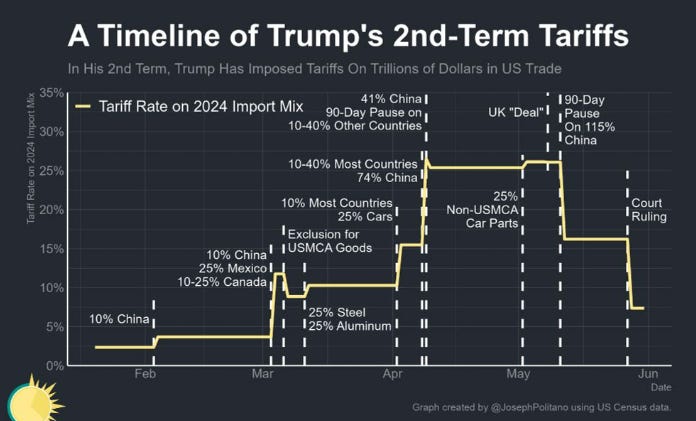The week that was began with the Memorial Day remembrance of fallen US service members in war. Pictured above, as good Allies do, Roberta Metsola, President of the EU Parliament, represented the gratitude of the peoples that Americans fought and died to defend. We are also reminded that the modern military mortuary service is a critical function of the logistical enterprise, whose formalized activities to bring home or officially inter overseas began in the 19th century and is discussed in the works of the Patron Saint of this blog, Erna Risch.
Ukraine War
Ukrainian intelligence reports that Russia is signing new recruits at a rate of 1000-1200 per day. While Moscow’s obstinance is troubling, these figures represent barely the replacements necessary with losses in the “special military operation.”
Russian transport infrastructure is struggling to maintain itself - billions in new investments in rail, cars, and locomotives are cut from current Russian Railways spending. Two incident, a road-rail bridge collapses at Bryansk - by malice and poor maintenance - and the attack on a military supply train carrying food and fuel forward will not help the transport problems within the country or the materiel deficiencies at the front. Consumable agricultural production is also struggling, as projected output of potatoes, sugar beets, and other vegetables are lagging demand.
The detritus of war is eternal, and in Ukraine, as the rise of the fibre optic drone alters the course of battle, the dead tethers litter the countryside. The long term effect of this waste will be reckoned to be sure.
On the Allied logistics front, pledges continue. Sweden has offered another half billion in military aid while its air forces contribute to the defense of the forward logistics hub in Poland. Germany signed a major military aid bill, with nearly 5B Euros pledged for air defenses, long range missiles, munitions, and more. Supporting the Life Strategy and the restoration of the domestic economy, Swedish grocery stores will make it easier for Ukrainian suppliers to sell to Sweden and will highlight those products so that consumers can easily find them on store shelves and support Ukraine.
Building on the experience and expertise developing with the Ukraine War operation, Poland announces plans to drastically expand capacity at the current facility to create the largest logistics hub on the continent to support pan-Euro defense and Ukrainian reconstruction. By the numbers: “The terminal is currently being expanded, and once the work is completed, it will have a transshipment capacity of over 500,000 TEU (twenty-foot equivalent units) per year. At present, its capacity is nearly 285,000 TEU annually.” And for the physical infrastructure of its frontier security, enjoy the Polish Bollards and Trenches of Defense
:
And so, Deep Strike came into its own last week, capped with a stunning mass attack on Russian strategic airpower assets on Sunday. Much was made of the diplomatic announcement from Germany that the Allies were lifting range limitations on Ukraine’s use of their missiles. While the politics narrative crowd will follow this as the determinative factor, over here in Logistics Land, we see this as a signal that capacity in these capabilities is sufficient for a robust and meaningful campaign.
Sunday brought the Great Drone Strike. In an operation of 18 months’ preparation to in include pre-positioning fleets of drones hidden within compartments concealed in shipping containers, the “barrage” of drones was unleashed yesterday against the bomber and attack fleet, with nearly one third of the Russian inventory destroyed, and secondary disruption to truck transport as authorities manage this new risk. We discuss timing and Deep Strike in this previous blog on the logistics strategies of the war:
Ukraine’s defense industry is producing gains in manufacture and consulting. As output numbers of domestically built drones increase, the UF experience and expertise with the new combined arms asset is being leveraged by European allies. Ukraine’s industrial economic success follows the trend of total wars favoring the side of greater liberal democracy - read here on WWI and WWII experience.
Disasters and Crises
The story of “B- Shift” - just one of many units of the St. Louis Fire Department that managed the storm aftermath - and its response to the tornado that hit the city is described here.
In France, storm damage resembles “scenes of war”. The climate crisis’ violence is a security issue more need to accept exists.
Trade
Brexit is the Ghost of Tariffs Future that the Americans should heed as all manner of quotidian supply is affected, in this case the discussion is around food imports. There are few choices where tax/regulatory obstacles exist, so the options are compromise, higher prices, or empty shelves.
So much turmoil in the Trump Administration Tariff policy it is difficult to keep track. On the 28th, the US Court of International Trade ruled the tariffs void under their justification, stating the administration did not have sufficient cause for the emergency powers it had invoked. This opinion on the President’s emergency tariff power comes with a call to other experts on trade to comment on the CIT ruling. To keep track to the current moment - but in no way predictive of the future - you can refer to the infographic below:
Agriculture
As the 2026 budget is debated, here is the agriculture policy expert Sarah Taber with a video explainer on crops, tax breaks, and farm subsidies, and why the sector looks as it does.
In Europe, French farmers are successfully testing the use of scents to repel pests to common crops.
Travel and Transportation
European airlines are capping growth and cutting some flights to US cities as travelers shift their travel to the Americas elsewhere, with more choices for regional destinations north and south of the Lower 48.
Electrification of fleets offering green solutions to mass transit - Nairobi, Kenya and Kigali, Rwanda retire diesel platforms and expand electric bus service on select routes.
In Manhattan, the bi-state Port Authority and officials from New York and New Jersey broke ground for the new bus terminal that will replace the 75 year old icon of midtown grunge. I have been transiting the 42d St. bus hub for several decades, and it never seems to have had a glory day.
This trade friendly piece on drones and short and mid-range cargo is a good piece on which to practice critical reading, interrogating where its biases influence the analysis. Whether you ultimately agree with the thrust of the piece, it is important to exercise this skill.
The EU wants to establish a security hub for the Black Sea, monitoring the Russian fleet for regional infrastructure defense and Ukraine’s security. To the north, to counter Russian maritime threats in colder waters, Sweden will start collecting insurance information from the tankers of the Shadow Fleet transporting sanctioned oil exports. In a more extreme response, Denmark considers seizure of the vessels that enter its waters at a critical chokepoint to the Baltic Sea. Straits remain undefeated as levers of power under decisive control.
Infrastructure
Celebrating 88 Years, the Golden Gate Bridge opened to the public on 27 May 1937, and vehicle traffic the next day. Check out the Library of Congress collection of vintage footage from the debut.
The DOGE practice of exaggeratedly long days, and even living in, leaves infrastructure far worse for wear. As its personnel departed the USIP building it had occupied after the illegal dissolution of the organization, the conditions reported by the Institute’s chief executive reflect poorly upon Musk: “in disarray, full of water damage, rats, and roaches.”
Protecting the natural infrastructure of local waters will become an increasingly important function of the state as the climate and resource depletion crises continue - read this on the Greek actions to put more of its sovereign maritime space under protective control.
Information Management
Maintaining digital archives beyond the medium term invites significant complications and requires care and planning to do well. JSTOR, among the premier scholarly publications databases and knowledge aggregators, offers insights to best practices.








